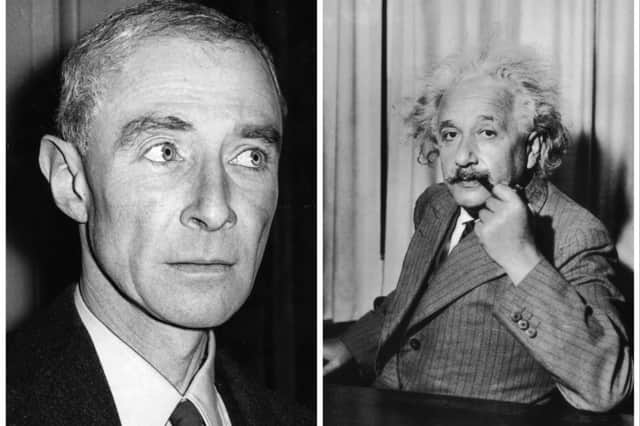What did Einstein say to Oppenheimer? The ending of film and connection between two scientists explained
This article contains affiliate links. We may earn a small commission on items purchased through this article, but that does not affect our editorial judgement.
and live on Freeview channel 276
It’s a brilliant time for film lovers at the moment, with the release of two blockbuster films at once - Oppenheimer and Barbie. Both films have been met with rave reviews from critics, but fans of the former have been left wondering about the connection between the titular Oppenheimer and Albert Einstein.
The biographical film, directed by Christopher Nolan, tells the story of American physicist J Robert Oppenheimer, who helped to create the atomic bomb in the Manhattan Project during the Second World War. Oppenheimer became known as the father of the atomic bomb because of the instrumental role he played in developing the weapon of mass destruction that would bring the war in Japan to a close.
Advertisement
Hide AdAdvertisement
Hide AdAs with other Nolan films, this one follows a non-linear timeline which has caused some confusion for some viewers about the closing scenes of the film, which show Oppenheimer talking to Einstein, one of the greatest inventors of all time.
If you’ve already watched the film and want to find out more about the ending, including what Einstein said to Oppenheimer, keep reading. Warning, this article does contain spoilers.
What was Einstein’s connection to Oppenheimer?
Einstein and Oppenheimer were both scientists, though from different generations. Oppenheimer was born 1904 and died 1967 while Einstein was born in 1879 and died in 1955. The pair did, however, know each other but they were not particularly friends.
But, Einstein does still have a link to Oppenheimer. Einstein sent a letter to President Franklin D. Roosevelt in August 1939 during World War Two, warning him that Germany could be working on a weapon of tremendous destructive power and urging the United States to create something similar. This advice led to the creation of the Manhattan Project, however, Einstein did not work directly on the atomic bomb project. Instead, Oppenheimer took Einstein’s ideas and theories and used them to direct the Manhattan Project scientists to design and test an atomic bomb.
Advertisement
Hide AdAdvertisement
Hide Ad

What did Einstein say to Oppenheimer?
We see various conversations between Einstein and Oppenheimer during the film. Early on, for example, Oppenheimer asks Einstein to review some concerning calculations as the Manhattan Project gets under way due to concerns that the bomb could create a chain reaction which would ultimately destroy Earth. Einstein advises Oppenheimer to have another physicist look at the calculations.
In the final scene of the film, Oppenheimer (Cillian Murphy) reminds Einstein (Tom Conti) that while the bomb was still being constructed, they had fears that it could accidentally begin a chain of events that would destroy the entire universe. Einstein asks: "What of it?", and Oppenheimer's answer is: "I believe we did”. This is the final line of the film and what follows is a montage of images depicting the world being destroyed by modern nuclear weapons.
This exchange is accepted to mean that Oppenheimer and Einstein understand that they have created a device through science which, when mixed with politics and other world viewpoints, has the potential to destroy the world.
Nolan has, however, admitted that Oppenheimer did not speak to Einstein about his fear of a disastrous chain reaction. Instead, he spoke to Arthur Compton, a Nobel Prize winner who directed the Manhattan Project’s University of Chicago outpost. Nolan explained in an interview with The New York Times, that he “shifted” the conversation to Einstein because “Einstein is the personality people know in the audience."
Comment Guidelines
National World encourages reader discussion on our stories. User feedback, insights and back-and-forth exchanges add a rich layer of context to reporting. Please review our Community Guidelines before commenting.
